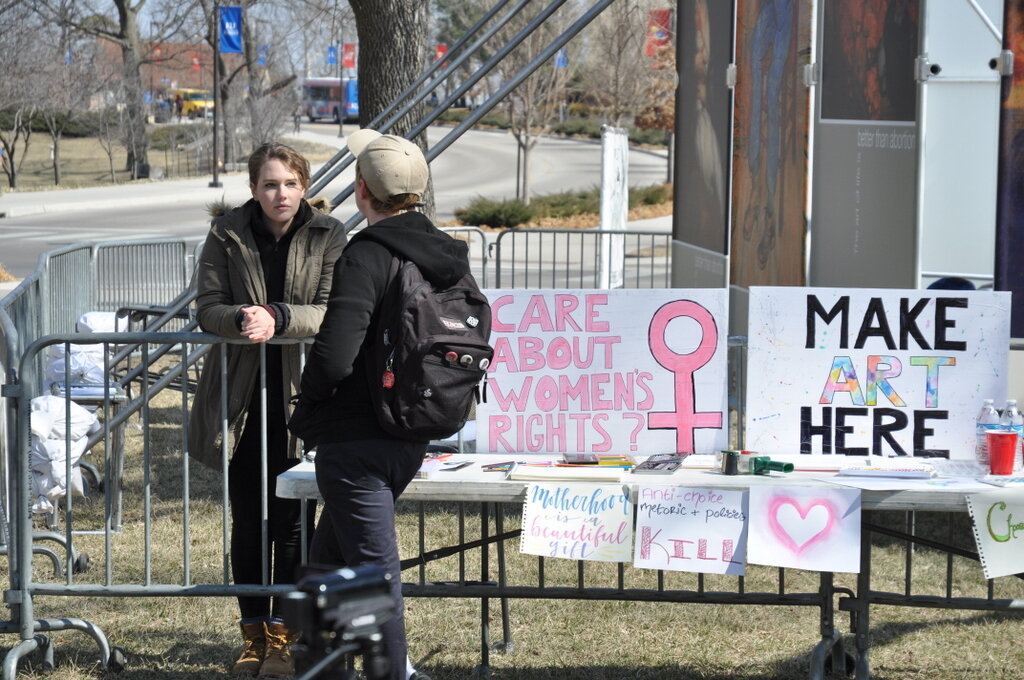Heidi: I think because I’ve always wanted to be a mom. My mom has always said I was born to be a mother. I was raised pro-life, but like I said, I don’t think I can tell others that they can’t get an abortion.
Grace: Do you believe that there are some things mentioned in the Bible, which we believe as
Christians, that also should be laws? For example, one of the Ten Commandments is “Thou shalt not kill.” Do you think we should make murder legal because the law against it may be influenced by a Christian belief?
Heidi: No, of course not! You’re right, that law makes sense for everyone even though it’s also a Christian belief.
Grace: This may sound like a weird question to ask, but what is the definition of murder?
Heidi: It’s when you kill an innocent person… and if abortion kills a human being, then it must be murder!
Notice how I first built common ground with Heidi. I tried to identify with her discomfort about forcing others, by law, to comply with a belief system they don’t currently hold. Because of this, Heidi felt heard and understood. After I built common ground, though, I raised an example of a law that coincides with our religious beliefs, but which can clearly be legally applied to all citizens regardless of religion. Heidi quickly recognized that outlawing abortion falls into this category. If abortion kills an innocent human being, it is not only morally wrong, but must be legally outlawed for everyone.
PART 2: THE UNBORN - A LIVING, HUMAN ORGANISM
Heidi began to realize that if abortion kills an innocent human being, it must be restricted legally. This naturally took us into the next part of our conversation, in which we discussed the humanity of the unborn, biologically. It was such a fun conversation because we were both becoming increasingly excited! I was curious about her views on the biology of the unborn, so I decided to clarify whether or not we held the same beliefs on that subject. My hope in asking these questions was to make her more confident in her position against abortion.
Grace: I remember you mentioning earlier the word “life,” and I’m curious, what does the word “life” mean for you? You may have noticed I ask for definitions pretty often, and that’s because, over time, I’ve realized that people can have different intended definitions for the same words.
Heidi: Oh, okay. Well, actually, I was just studying this! [Heidi excitedly took out her course notes to reference them.] When I say “life,” I think I mean development. I’m in a developmental motor skills class, and I was just reading about how, from the moment that fertilization is completed, development is happening!
Grace: So if the unborn is developing from the point of fertilization, would you agree that it must be alive?
Heidi: Yes.
Grace: Would you further agree with me that, because living things reproduce after their own kind, the unborn must also be human?
Heidi: Yes.
Grace: And do you agree that the unborn is a whole organism?
Heidi: I... think so…
She said this slowly. I could tell she wasn’t sure what I meant, so I asked a follow-up question to clarify terms and to make sure that Heidi and I were on the same page.
Grace: What do you mean when you use the word “organism”?
Heidi: Hmmm. I don’t know exactly. What is the definition of the word “organism”?
Grace: I can’t give you the exact definition off of the top of my head, but an organism is an individual life form. For example, the leaf of the plant on the table next to you is a part of the whole organism, which is the plant. In the same way, your thumb is a part of your body; but you, Heidi, are the whole organism. So in the same way, sperm and egg are functional parts of a man and a woman. However, when they combine, they cease being parts of another person’s body, and a new whole organism comes into existence, on its own self-directed path of development. Does that make sense? (Note: See our Extending Your Learning page to read Maureen Condic's excellent article on this topic, “Life: Defining the Beginning by the End.”)
Heidi: Yes! So the unborn is the same kind of thing that we are; it’s just at a different stage of development!
We were then interrupted by one of the kids coming downstairs complaining of a sore throat. After administering medicine and sending him back up to bed, Heidi and I continued our conversation.
Notice that instead of simply telling Heidi that she had a misunderstanding about the biology of the unborn, I asked her questions so that I could think through it alongside her. In Justice For All’s Abortion: from Debate to Dialogue seminar, I help to train participants to dialogue about the biological humanity of the unborn. One way that we do this is through a tool developed by Steve Wagner. This tool can be said in ten seconds (below), or broken down more slowly in a conversation, as exemplified in my dialogue with Heidi.
Steve calls this the 10-Second Pro-life Apologist. Here’s how it goes:
If the unborn is growing, isn’t it alive?
And if it has human parents, isn’t it human?
And living humans, or human beings like you and me, are valuable, aren’t they?
I want to encourage you to have your own conversations about abortion, and remember that it doesn’t take years of study and experience to ask thought-provoking questions, to listen, and to point out areas of agreement. It is helpful, however, to have a little bit of knowledge of the biological development of the unborn, so that you can refer to it as I did in my conversation with Heidi. To help you further defend the biological humanity of the unborn, I’ve listed bullet points from the interactive guide participants use in our seminar.
EVIDENCE THAT THE UNBORN IS A LIVING, HUMAN ORGANISM:
1. The unborn is living.
2. The unborn is human.
3. The unborn is a whole organism.
Integrating its body parts for the good of the whole
Actively developing itself through the stages of human development
If adults are organisms, and all that was added to them from fertilization was a proper environment and adequate nutrition, then the unborn at fertilization must have been an organism as well.
PART 3: HUMAN EQUALITY AND WOMEN'S RIGHTS
When I last wrote, I paused the story when one of the kids whom Heidi was babysitting complained of a sore throat. After helping him and sending him back to bed, Heidi and I continued our conversation:
Heidi: One of my main concerns is that I live in a city that is very liberal, and being pro-life is not popular. I don’t want to be considered…
Grace: Anti-woman?
Heidi: Yeah!
Her eyes widened. It seemed to be a comfort that I understood why she felt torn. I then asked her if she would like for me to explain to her the reasons I can call myself a feminist and a pro-life advocate. “I would love it if you would,” she replied with a big smile stretching across her face.
I then shared with Heidi the Equal Rights Argument*, a series of questions that can help someone to understand that equal rights can only be based on something that we all share equally, and the thing we share equally that best explains our equal rights is our common humanity.
Grace: Let’s take a step away from the topic of abortion for a moment. Do you agree that all born human beings deserve equal treatment? If you agree that we deserve to be treated equally, then there must be something equal or the same about us, right? So what is the same about us that demands our equal treatment?
Heidi: It’s that we’re human! I think I know where you’re going with this!















